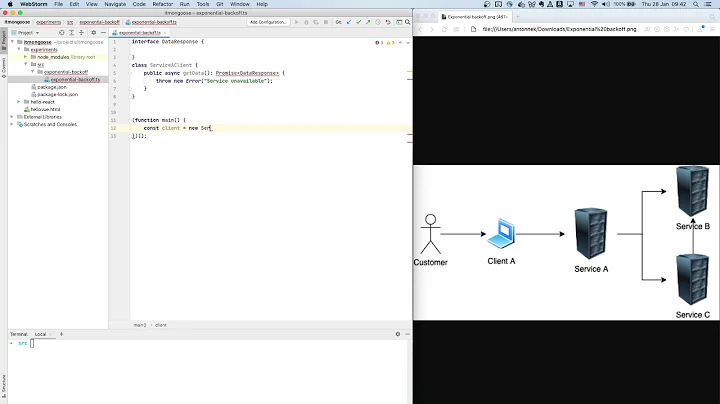Retry Celery tasks with exponential back off
Solution 1
The task.request.retries attribute contains the number of tries so far,
so you can use this to implement exponential back-off:
from celery.task import task
@task(bind=True, max_retries=3)
def update_status(self, auth, status):
try:
Twitter(auth).update_status(status)
except Twitter.WhaleFail as exc:
raise self.retry(exc=exc, countdown=2 ** self.request.retries)
To prevent a Thundering Herd Problem, you may consider adding a random jitter to your exponential backoff:
import random
self.retry(exc=exc, countdown=int(random.uniform(2, 4) ** self.request.retries))
Solution 2
As of Celery 4.2 you can configure your tasks to use an exponential backoff automatically: http://docs.celeryproject.org/en/master/userguide/tasks.html#automatic-retry-for-known-exceptions
@app.task(autoretry_for=(Exception,), retry_backoff=2)
def add(x, y):
...
(This was already in the docs for Celery 4.1 but actually wasn't released then, see merge request)
Solution 3
FYI, celery has a util function to calculate exponential backoff time with jitter here, so you don't need to write your own.
Related videos on Youtube
Comments
-
 Oleksandr almost 2 years
Oleksandr almost 2 yearsFor a task like this:
from celery.decorators import task @task() def add(x, y): if not x or not y: raise Exception("test error") return self.wait_until_server_responds(if it throws an exception and I want to retry it from the daemon side, how can apply an exponential back off algorithm, i.e. after
2^2, 2^3,2^4etc seconds?Also is the retry maintained from the server side, such that if the worker happens to get killed then next worker that spawns will take the retry task?
-
 Oleksandr about 12 yearsDo you know if this is a server side retry or the client is kept to wait? If the client is kept to wait then it’s bad.
Oleksandr about 12 yearsDo you know if this is a server side retry or the client is kept to wait? If the client is kept to wait then it’s bad. -
idanzalz over 11 yearsAs far as I know the countdown attribute sets an eta for the task at the MQ backend (e.g. RabbitMQ). So it is not set on the client side.
-
asksol over 11 yearsclient is not kept to wait unless you do
result.get()which is an explicit request to wait for the result to be ready, but there's also a timeout argument and there's a RETRY state so you can check if the task is being retried (and what the reason for the retry was) -
robbyt over 10 yearsFor celery 3.1, you should use
@task(bind=True)and celery will passselfinto the function as the first argument, so you would change the args to bedef update_status(self, auth, status):which then gives you access toself.retries -
 tutuDajuju almost 9 yearsthanks @robbyt ! just a small correction -
tutuDajuju almost 9 yearsthanks @robbyt ! just a small correction -retriesis an attribute ofrequest, soself.request.retriesis the proper call. -
 Matt over 6 yearsCan you add an example how to call the task with
Matt over 6 yearsCan you add an example how to call the task with@task(bind=True), Normally I would just,from tasks.py import update_status; update_status(auth, status)but what should I pass in forself? -
kororo about 6 yearsNice catch, scratching my heads in 4.1.0, why my parameter of "retry_backoff" not respected.
-
rdrey almost 6 years@kororo it doesn't seem to work with
self.retry, only other exception types -
 qwertysmack over 3 yearsWith this approach you also benefit from the built in
qwertysmack over 3 yearsWith this approach you also benefit from the built inretry_jitter(defaulted toTrue) which avoids the Thundering Herd Problem mentioned in asksol's answer -
jorf.brunning almost 3 yearsThis is the correct answer given that it is built-in, and does not require manually handling countdown
-
jorf.brunning almost 3 yearsPlease see other answer to this question for a built-in answer instead: stackoverflow.com/a/46467851/9190640
-
Sarang over 2 yearsDoes this also work when
retry()is called? It doesn't seem to work for non-automatic retries (on Celery 4.2.2 at least). Anyone has any idea? -
 dKen about 2 yearsIn the future, avoid link-only answers, as links tend to go stale over time. Best to also include a code snippit and explanation in your answer for maximum upvotes and value-add. Edit: case in point, this answer's link is already broken stackoverflow.com/a/46467851/366529
dKen about 2 yearsIn the future, avoid link-only answers, as links tend to go stale over time. Best to also include a code snippit and explanation in your answer for maximum upvotes and value-add. Edit: case in point, this answer's link is already broken stackoverflow.com/a/46467851/366529






